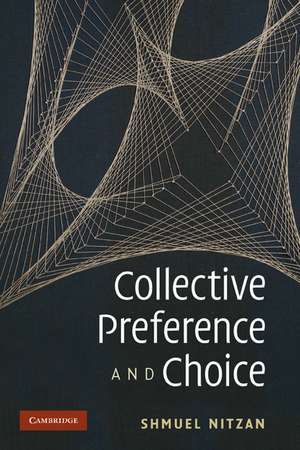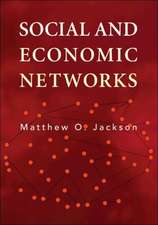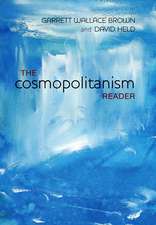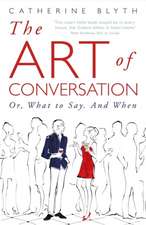Collective Preference and Choice
Autor Shmuel Nitzanen Limba Engleză Paperback – 9 dec 2009
Preț: 293.17 lei
Nou
Puncte Express: 440
Preț estimativ în valută:
56.10€ • 61.13$ • 47.27£
56.10€ • 61.13$ • 47.27£
Carte tipărită la comandă
Livrare economică 23 aprilie-07 mai
Preluare comenzi: 021 569.72.76
Specificații
ISBN-13: 9780521722131
ISBN-10: 0521722136
Pagini: 274
Ilustrații: 7 b/w illus. 1 table
Dimensiuni: 150 x 226 x 11 mm
Greutate: 0.43 kg
Editura: Cambridge University Press
Colecția Cambridge University Press
Locul publicării:Cambridge, United Kingdom
ISBN-10: 0521722136
Pagini: 274
Ilustrații: 7 b/w illus. 1 table
Dimensiuni: 150 x 226 x 11 mm
Greutate: 0.43 kg
Editura: Cambridge University Press
Colecția Cambridge University Press
Locul publicării:Cambridge, United Kingdom
Cuprins
List of figures; List of tables; Preface; Acknowledgments; Part I. Introduction: 1. The reason for the problems; 2. Brief overview of the problems; 3. The relationship between preferences and choice; Part II. Different Preferences: 4. Do social preferences exist? Arrow's and Sen's impossibility theorems; 5. The desirable collective decision rule: axiomatization; 6. Rule selection based on the compromise with the unanimity criterion; 7. Paradoxes of voting; 8. Majority tyranny and expression of preference intensity; 9. The problem of inefficient provision of public goods; 10. Do individuals reveal their true preferences?; Part III. Identical Preferences – Different Decisional Skills: 11. Which rule is better: the expert rule or the simple majority rule? Decisional errors in dichotomous choice and Condorcet's jury theorem; 12. The optimal decision rule under uncertain dichotomous choice; References; Index.
Recenzii
'This is a first rate book, covering basic social choice theory (Arrow, Sen, Condorcet, Borda, etc.), as well as group choice when individuals seek the same objective but disagree on how to bring it about - an area in which Shmuel Nitzan himself has made seminal contributions. The material is well presented. This lucid treatment is ideal for newcomers to the field, but it will also be a valuable resource for graduate students. For every page of text there is half a page of exercises with solutions.' Donald Campbell, College of William and Mary
'Written by one of the major contributors to the field, this book is an excellent introduction to social choice. Covering the basic questions of the definition and elicitation of social choice, the book will be a great resource for students of economics and political science, as well as for researchers in social science, computer science, and related fields.' Itzhak Gilboa, Tel Aviv University and HEC, Paris
'Shmuel Nitzan is well-known to all scholars and students of social choice theory for his important articles published in leading outlets of the profession. His new book incorporates and expands upon those contributions in a very accessible manner. It contains much material not found in other textbooks in the field. Professor Nitzan's long experience as a teacher is pleasantly visible from the very beginning of the text. Each chapter is succinctly and competently summarized. A very nice instructional touch is added to the book by solved exercises at the end of each chapter. This makes the book most useful not only in the classroom, but also in independent study.' Hannu Nurmi, University of Turku
'Written by one of the major contributors to the field, this book is an excellent introduction to social choice. Covering the basic questions of the definition and elicitation of social choice, the book will be a great resource for students of economics and political science, as well as for researchers in social science, computer science, and related fields.' Itzhak Gilboa, Tel Aviv University and HEC, Paris
'Shmuel Nitzan is well-known to all scholars and students of social choice theory for his important articles published in leading outlets of the profession. His new book incorporates and expands upon those contributions in a very accessible manner. It contains much material not found in other textbooks in the field. Professor Nitzan's long experience as a teacher is pleasantly visible from the very beginning of the text. Each chapter is succinctly and competently summarized. A very nice instructional touch is added to the book by solved exercises at the end of each chapter. This makes the book most useful not only in the classroom, but also in independent study.' Hannu Nurmi, University of Turku
Notă biografică
Descriere
A study of the classical aggregation problems that arise in social choice theory, voting theory, and group decision-making under uncertainty.















